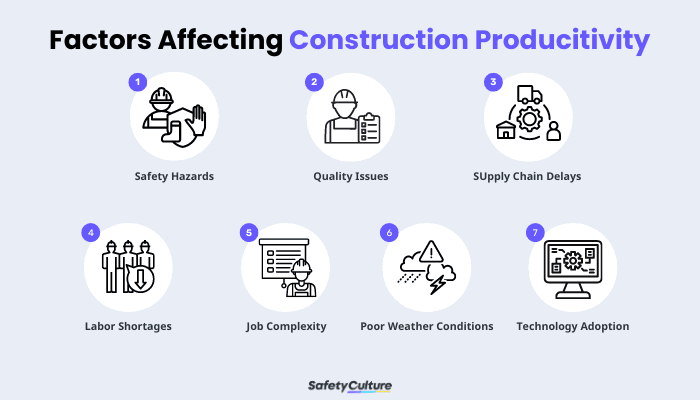Boosting Construction Productivity: Best Practices for Teams
Discover effective strategies to enhance construction productivity in your projects.

Published 25 Sept 2025
Article by
6 min read
What is Construction Productivity?
Construction productivity refers to the efficiency with which construction projects are completed. It encompasses various factors, including time management, resource allocation, workforce skills, and the use of technology and equipment.
With high construction productivity levels, projects are being completed faster and at a lower cost. These are crucial for better project outcomes, client satisfaction, profitability, and competitiveness in the industry.
Factors Affecting Construction Productivity
Various internal and external factors influence construction productivity. Delays or project scope changes could adversely affect the budget and timeline.
Here are some of the most common factors that impact construction productivity:

Factors Affecting Construction Productivity
Safety Hazards
The Occupational Safety and Health Administration (OSHA) has identified the top 10 construction safety standards frequently violated, resulting in penalties totaling $80.6 million for companies. Furthermore, the Center for Construction Research and Training (CPWR) reports that the “Fatal Four“—falls, being struck by equipment, being caught between objects, and electrocutions—contribute to 65 percent of all construction-related fatalities.
These safety hazards, when not taken care of, can lower employee morale, increase accidents, and disrupt overall operations.
Quality Issues
A survey conducted by PlanGrid and FMI reveals that the construction industry spends around $178 billion to correct mistakes. These mistakes result in rework on construction projects, which can comprise 9-20 percent of total project costs. Additionally, quality.org indicates that as much as 70 percent of all construction rework is associated with engineering and design errors.
Supply Chain Delays
Construction projects are complex, with multiple stakeholders and suppliers involved. Supply chain disruptions can cause delays in material deliveries, resulting in project setbacks and increased costs. For instance, climate change and geopolitical tensions can impact the global supply chain of construction materials and equipment.
Labor Shortages
The construction industry faces a significant labor shortage due to an aging workforce. Currently,45 percent of construction workers are aged 45 and older, with 25 percent exceeding 55 years old. This demographic shift is creating significant challenges for the industry’s future. According to the Associated Builders and Contractors (ABC), the sector must bring in nearly 454,000 new workers on top of normal hiring to meet industry demand.
Job Complexity
Construction projects are becoming increasingly complex, requiring high coordination and communication among various stakeholders. Projects that involve multiple phases, numerous subcontractors, or large-scale infrastructure require strategic planning and efficient management to ensure productivity is not compromised.
Poor Weather Conditions
Inclement weather is a significant factor in construction productivity. It can cause delays, affect site conditions, and potentially lead to accidents. Severe weather events are becoming increasingly common due to climate change, making it essential for the industry to incorporate weather contingency plans into project planning.
Technology Adoption
While technology adoption in the construction industry is on the rise, many construction companies still need to rely on traditional methods, which can lead to productivity issues. However, with the latest construction innovations, such as Building Information Modeling (BIM), drones, and Virtual Reality (VR), companies can improve collaboration, planning, and decision-making processes, ultimately boosting productivity.
How to Improve Construction Productivity
With so many factors affecting productivity, there isn’t a one-size-fits-all solution to fix everything at once. The good news is that there are practical ways to increase productivity and improve construction management so you can concentrate on your main tasks and achieve your goals. Some of these include:
Keep Your Goals Realistic
Setting realistic goals is essential for project success. Unrealistic expectations can lead to rushed work, cutting corners, and poor quality. Instead of completing a project in an unrealistic time frame, focus on achievable targets based on your resources and capabilities.
Use Construction Productivity Software
Digital tools such as construction project management software, drones for site surveying, BIM, or Artificial Intelligence (AI) can streamline processes and improve productivity. These tools also offer real-time data collection and analysis, helping to identify issues before they become major problems.
Streamline Your Construction Operations
Unlock the power of data-driven insights, standardized processes, and effective communication to improve efficiency and productivity across all jobsites.
Take Care of Project Planning
It involves clear project schedules, resource allocation, and risk management. Unsurprisingly, projects begun without thorough planning are more prone to delays, budget issues, and resource shortages. Some of the things that you need to give proper consideration include:
Creating a timeline
Key dates and deadlines
Allocation of resources (labor and equipment)
Managing risks
Establish Metrics and Measurement Tools
Improving your company’s productivity can be challenging, if not impossible, without knowing what to analyze. Setting achievable goals and tracking progress using Key Performance Indicators (KPIs) will help determine areas for improvement. Here are some things you can measure:
Labor productivity
Workforce utilization
Industry benchmark
Use Effective Supply Chain Management Practices
Supply chain issues can be unpredictable, but you can prepare by following best practices. Some of this includes understanding common resource management challenges, such as inventory miscounts, and finding ways to address them. Keep a close eye on material use and order new supplies in advance if you anticipate running low during a project.
Provide Proper Training and Support
Investing in your workforce is crucial to boosting productivity. Training programs and ongoing support can improve the quality of work, reduce rework, enhance communication, and foster a safety culture on-site. Additionally, providing your workers with the latest tools and technology can increase efficiency.
Maintain Clear Documentation
Proper record-keeping helps track progress, identify areas for improvement, and mitigate disputes. Keep accurate records of project plans, schedules, budgets, change orders, and other necessary documentation. It’ll help you stay organized and make informed decisions if issues arise.
Encourage Collaboration and Feedback
Construction projects involve multiple stakeholders, and effective communication is critical to productivity. Facilitate problem-solving and decision-making and encourage open communication between teams, subcontractors, and clients. Seeking feedback from workers can also help identify potential issues and improve processes.
Mitigate Weather-Related Risks
Weather is unpredictable and can disrupt your plans, particularly when you’ve scheduled a project months in advance. However, you can minimize its impact with careful planning and contingency strategies. Regularly reviewing weather forecasts and adjusting your schedule can help avoid delays.
Increase Construction Productivity with SafetyCulture
Why Use SafetyCulture?
SafetyCulture is a mobile-first operations platform adopted across industries such as manufacturing, mining, construction, retail, and hospitality. It’s designed to equip leaders and working teams with the knowledge and tools to do their best work—to the safest and highest standard.
Streamline processes, eliminate bottlenecks, enhance resource utilization, and build an agile and scalable infrastructure with SafetyCulture. Strive for operational excellence to boost competitive advantage, foster sustainable growth, and deliver long-term value.
✓ Save time and reduce costs✓ Stay on top of risks and incidents✓ Boost productivity and efficiency✓ Enhance communication and collaboration✓ Discover improvement opportunities✓ Make data-driven business decisions
Related articles
Compliance
Construction Site Compliance

Build a Solid Foundation with Caisson Construction
Find out how caisson construction can provide a stable foundation for your next project in a quick, cost-effective, and reliable manner.
Compliance
ISO

A Brief Guide to ISO 22000 Training
Explore the factors, requirements, and best practices for delivering impactful ISO 22000 training and implementing systems effectively.
ISO
Compliance

Comprehensive Guide to ISO 45001 Training for Work Safety
Explore the benefits of delivering ISO 45001 training across multiple industries and choose what works best for your team.